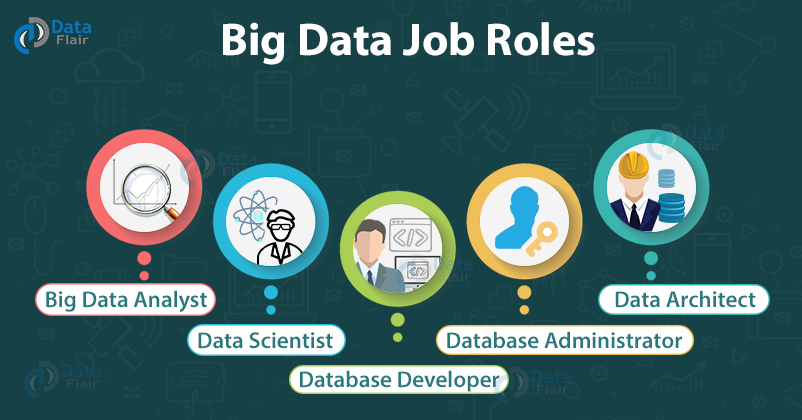5 Big Data Job Roles that will pay you highest in the industry
In today’s time, the field of big data can take your career to new heights. But, it is essential to choose the right job profile that matches your skillset and knowledge.
Let’s consider a list of job roles in Big Data that bring maximum profit:
Big Data Job Roles
1. Big Data Analyst
The Big Data analyst examines huge amounts of information with a complex heterogeneous or uncertain structure (research results, market trends, customer preferences, etc.).
The analysis of the data can give a different level of understanding of the subject of research and the observed phenomena. The result brings discoveries and new technologies, substances, and approaches to the phenomena of various spheres of life.
The main competence of a specialist in Big Data is the ability to see logical connections in the arrays of collected information, and based on this, develop new approaches and solutions.
With the advent of technologies that make it possible to create multi-gigabyte arrays of information faster, the profession of Big Data analyst is becoming more and more popular.
Big Data engineers are responsible for storing, transforming, and quickly accessing data. Big Data analysts are responsible for analyzing data, identifying relationships, and building models.
2. Database Administrator
The database administrator creates the databases using a DBMS (database management system), for example, Microsoft SQL Server and Oracle Database.
Having designed the database, the administrator arranges its work, monitors the smooth operation of the server, and provides users with access to the necessary information, security, and guidance for their work.
In their work, the database administrators demonstrate knowledge of programming languages, basic network protocols, and services. Most of the working day passes in front of a computer monitor.
The first responsibility of the database administrator is to ensure the functioning of the database.
According to the requirements of the customer, in accordance with the needs of the company and the features of its activities, the administrator designs and sets up the database. He or she controls the server, improves the process of storing and processing information, and provides uninterrupted user access to data.
The database administrator is also responsible for ensuring its security. In an emergency, he or she must quickly recover the lost data.
The administrator must update the database and back up information from time to time. The experience of working as a database administrator will help this specialist to apply for a job as a database management system engineer.
3. Database Developer
A database developer is a specialist who creates databases, debugs them, modernizes them, and maintains them. To work in this area, higher technical education is required, as well as knowledge of the SQL query language. Specialists who decide to work in this profession perform the following tasks:
- Database design (selection of the right tools, analysis of the needs of the company’s system, etc.)
- Ensuring the efficient use of the created database
- Debugging and maintenance
- Securing data stored on the server
- Analysis of user complaints and suggestions, troubleshooting
- Consultations for system administrators
- Load analysis and updating the database engine
- Collaboration with administrators, programmers, and database architects
These specialists can be ordered to upgrade and subsequently maintain an existing database in order to increase its performance and security. This employee, if the company does not have a system administrator, works with the team, where he or she will conduct consultations and receive complaints.
4. Data Scientist
A data scientist is a specialist in the processing, analyzing, and storage of large amounts of data, the so-called Big Data.
The data scientist extracts the necessary information from a wide variety of sources using real-time information flows. He or she finds hidden patterns in data arrays and statistically analyzes them to make competent business decisions.
The workplace of such a specialist is not one computer or even one server, but a cluster of servers.
The data scientist uses various methods of working with data:
- Statistical methods
- Database modeling
- Mining methods
- Artificial intelligence applications for working with data
- Database design and development methods
5. Data Architect
A database architect is an experienced technician who manages a huge group of employees. He or she is engaged in selecting technology for data storage, creating and optimizing queries, drawing up development plans and technical specifications for subordinates, designing and optimizing databases, and monitoring database security.
Database architects are valuable specialists who not only develop the structure but also know how to administer and program the created databases.
The profession is quite complicated because the specialist has to do his or her job in such a way as to please the management, the technical department, and the employees of the company.
Everyone puts forward individual requirements, and the database architect should be able to explain to everyone what can be implemented in the project and what cannot.
In order to get a well-paid job, you need to have an appropriate education. Of course, education is not easy, and sometimes students need help.
For example, if you need essay help from essay writers, you need to choose an essay writing service like EssayShark. In this way, getting an education will be much easier.
Summary
If you want to choose a profession related to Big Data, select one of the job roles in big data to earn money. However, you should know that achieving success in any profession in this sphere is quite difficult.
Do share your feedback regarding big data job roles article in the comment section.
Did you know we work 24x7 to provide you best tutorials
Please encourage us - write a review on Google


